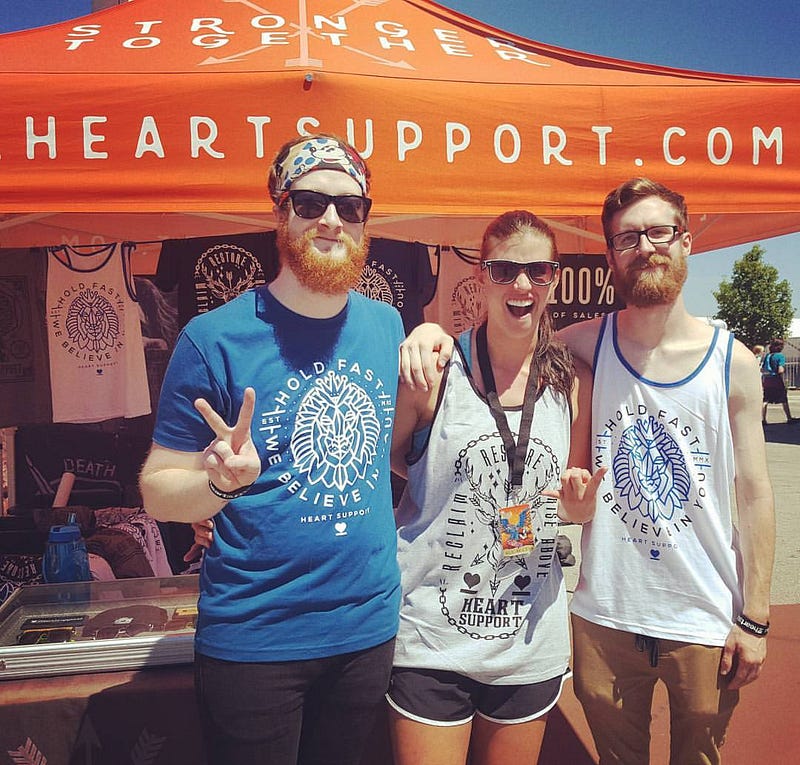Tips On How To Turn Hardship Into Leadership
Even in inopportune hardship and scenarios, you can inspire others towards greatness
The bead of sweat tickled as it ran down the small of my back. Reaching for the water bottle on the edge of the table was just enough exertion that more sweat beads formed and ran down to soak my waistband.
“It’s so humid I don’t want to move.” Nate, my co-worker, also leaned forward to grab his water bottle off the table. He removed the top and gulped down half the bottle only to frown. “Already warm. Like drinking urine.”
I nodded and removed my shirt while we sat in lawn chairs underneath a pop up tent in the middle of Vans Warped Tour. The traveling music festival is known for its hot summer days, nostalgic bands, and people passing out in the middle of mosh pits due to dehydration.
Nate and I continued to lounge, dreading the moment the concert doors opened where we’d spend the next eight hours drenched in sweat. Around us the bustle of loading and unloading trucks continued while a man with a radio shouted in our direction.
“Hey! We’re running behind schedule and need help unloading these trucks!”
Favoring the hearing loss in my right ear I pretended not to hear the all-call for volunteers from the Warped Tour staff. They paid people to unload the trucks, so “why should I be the one helping due to their incompetence?” I rationalized. My co-worker made no effort to move either. We sat in the shade drinking hot water and doing our best to act deaf.
But we ended up helping. Not because we wanted to, or were even told to. We became inspired by a selfless act of leadership that propelled us into action.
1. Leaders Eat Last
Viral author and TED speaker Simon Sinek wrote a book entitled Leaders Eat Last, which he derived from a military practice still in effect. In the military, the highest ranking officers and non-commissioned officers (sergeants and above) always eat last while the youngest and lower ranking troops eat first. Within the military the mindset is “take care of your troops first, and they’ll take care of you.” In combat, it’s uncanny how many troops will follow a leader who emulates service and sacrifice to the very Gates of Hell itself — regardless of their rank.
So if rank, position, or title carry no clout in leadership, what does? Sinek states:
“The rank of office is not what makes someone a leader. Leadership is the choice to serve others with or without any formal rank.”
That hot day on Vans Warped Tour, I watched my boss (and founder of our organization) climb aboard a truck and unload heavy boxes while he poured sweat for 45 minutes. What made this so inspiring is that he’s a Grammy nominated musician who headlined the Main Stage daily that year. There are techs and roadies to check his gear in addition to setting everything up for him. He can sit in an air-conditioned tour bus all day if he wanted and just show up to sing.
Instead, without a word, he climbed aboard and helped. My co-worker and I were so impressed we got up and helped too because of his example. Before we finished, I snapped a photo to remember that’s the person I wanted to be. That even in inopportune hardship and scenarios, you can inspire others towards greatness.
2. Delegate To Those Who Want to Do The Work (Not The Ones Who Want a Hand Out)
That same year on Vans Warped Tour I met a young woman named Rachel who volunteered for our organization. She ended up on the hottest day of the tour with the temperature reaching 115 degrees. One poor girl walked into our tent and vomited due to dehydration. Rachel ran to get medics while I got the girl to drink water and lie down. Throughout the day she remained a trooper. Impressed, I asked if she wanted to see any of the bands playing. I even offered to bring her backstage. Instead of accepting she told me, “I went through depression for almost a decade, and the work you do is so important. I just wanted to help. I can see bands anytime.”
Floored, I grabbed her contact information to stay in touch. The following year I offered her a spot on the tour with our organization for a week. She already showed she was a servant, but during a volatile moment on the tour, she set the bar for an entire bus full of men and women.
3. Leaders Do The Right Thing (Even When It’s Hard)
In most everyone’s life they’ve had a roommate that annoyed them or a “friend” who drove them crazy. Instead of confronting their behavior or seeking to understand, we often give them the cold shoulder or gossip about them behind their back.
That’s what happened with a bus mate that was driving people crazy.
But instead of shunning the young man our bus had conflict with, Rachel stepped into his life and dug underneath his exterior to find a wounded and hurt man. She offered compassion when others wouldn’t, and treated him kindly where others offered animosity. Even though it was hard to do — and unpopular — she did the right thing, and the entire bus respected her because of her actions.
What Rachel taught everyone through her actions was the importance of loving others back to health, even when they’re hard to deal with. Because of that, other men and women looked up to her.
It takes character and humility to do what’s right especially when no one else is doing it. Sometimes the hardest thing and the right thing end up being the same.
In life, each of us will face situations and life choices that are easier to ignore, run away from, or put ourselves first. What we so often forget is that it’s walking though storms and less than ideal situations that produces the men and women who inspire others.
So the next time you’re faced with a less than perfect scenario or hardship, instead of turning away from the calling to lead with humility and selflessness — step into it.






Comments
Post a Comment